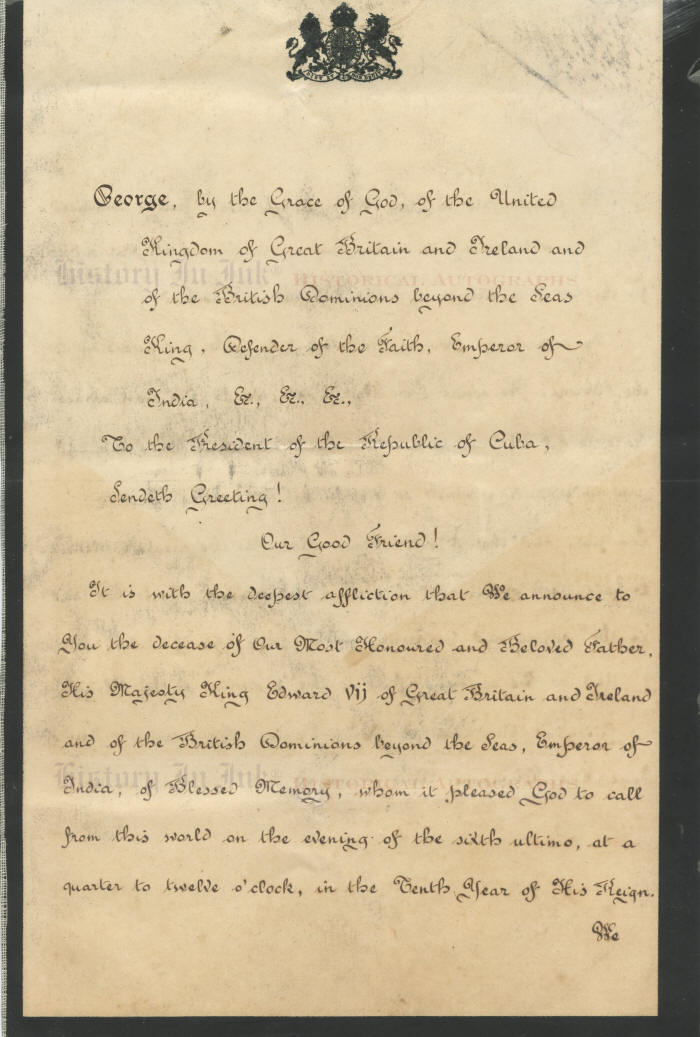

2021601
King George V
The new King poignantly announces the “mournful event” of his father’s death,
“feeling convinced that You will participate in Our grief and in that of all Our subjects”
George Frederick
Ernest Albert, 1865–1936.
King of the United Kingdom of Great Britain and Ireland,
1910–1927; King of the United Kingdom of Great Britain and Northern Ireland
and King of Ireland, 1927–1936; Emperor of India, 1910–1936 Manuscript letter signed, George R. I., three pages, 8” x
12”, on black-bordered mourning stationery, the Court of St. James’s
[London, England], June 20, 1910. Countersigned by Sir Edward Grey, 1st
Viscount Grey of Fallodon, KG, PC, DL, FZS (1862–1933), Secretary
of State for Foreign Affairs, 1905–1916.
A little over a month after
becoming King, George V poignantly announces in this formal diplomatic letter “the decease of Our Most Honoured and Beloved
Father,” King Edward VII. Writing to “Our Good Friend,” the President of the
Republic of Cuba, he advises of the death of “His Majesty King Edward Vii of Great Britain and Ireland and
of the British Dominions beyond the Seas, Emperor of India, of Blessed
Memory, whom it pleased God to
call from this world on the evening of the sixth ultimo, at a quarter to
twelve o’clock, in the Tenth Year of His Reign.” He
communicates
“this mournful event,” he says, “feeling convinced that You will
participate in Our grief and in that of all Our subjects, for the loss of a
Sovereign so justly esteemed and revered.”
The new King adds his
assurances that, with his accession to the throne, “it will be Our most
earnest desire to cultivate and to maintain the relations of Friendship and
good understanding which so happily subsist between the two Countries, and
that it will always afford Us the greatest pleasure to have fresh
opportunity of proving the interest which We take in the welfare and
prosperity of the Republic of Cuba.”
George V
had an excellent relationship with his father. Observers described Edward
VII and George V more as affectionate brothers
than as father and son. When his father died, George V confided to his
diary that he had lost his “best friend and the best of fathers.” He wrote that he “never had a [cross] word with him in my life. I am
heart-broken and overwhelmed with grief.”
This letter is handwritten in beautiful calligraphy and
bears the royal crest at the top.
George V and Viscount Grey have signed black fountain pen turned to
gray-brown. Both signatures are bold.
Overall this letter is in very good to fine condition.
It has one flattened horizontal
mailing fold, which does not affect the King’s signature. It has been laminated for
preservation with a fine, flexible plastic sheeting popular with libraries
and archives in the 1940s and 1950s because it allowed pages to flex, as the
pages to this letter do. There is some soiling on the first page that
appears to be beneath the lamination. In a few small spots, notably along the black
border, the laminating material has come off. The top edges of both
sheets have no black border, which may have been removed. Along the left
edges of the first and second sheets, there are remnants of a fine woven
material that is likely mull used either to bind the paper into conjugate leaves
or to preserve the edges of the sheets.
The sheets are separated, and there is no paper loss, but the separation
likely accounts for why a small portion of the paper surface from the top
left edge of the second sheet appears to be adhered to the top right edge of
the backside of the first sheet. On the back of the second sheet, there is a toned
image of the envelope and seal
consistent with adhesive staining from the envelope itself. The toning
has a three-dimensional appearance, although it is flat, and shows
through to the front of the second sheet around the King’s signature.
We have not found another letter by George V with content this compelling.
We found a few other diplomatic letters of George V in auction records, but
all of those were typed and had routine content relating to diplomatic
appointments. We therefore believe that this letter is at least
scarce, if not rare, given its form and content. It belongs in the
best of British royalty collections.
Unframed.
_____________
This item has been sold, but
click here to see other
World History items
that we are offering.



